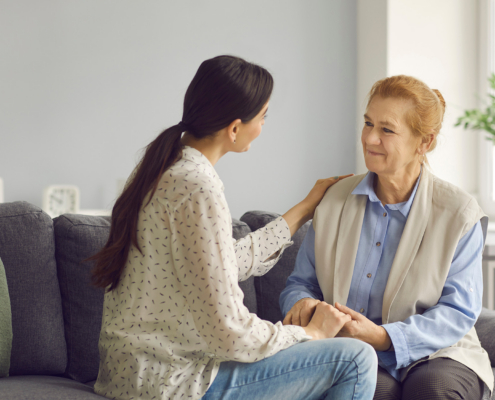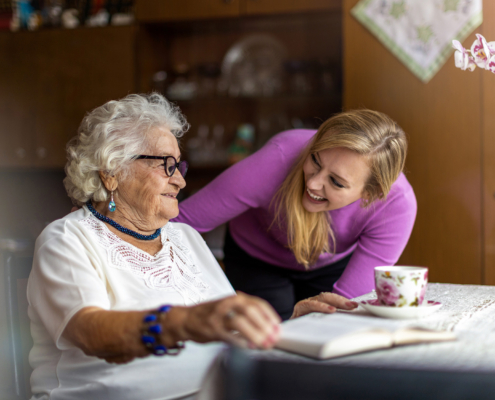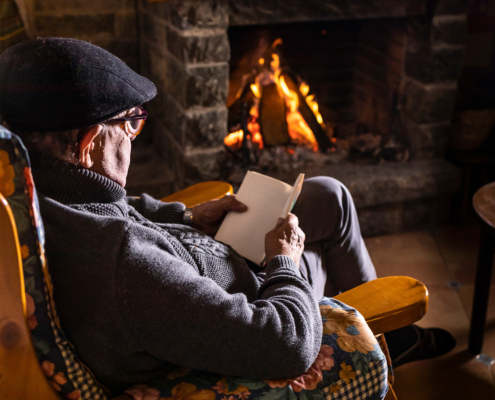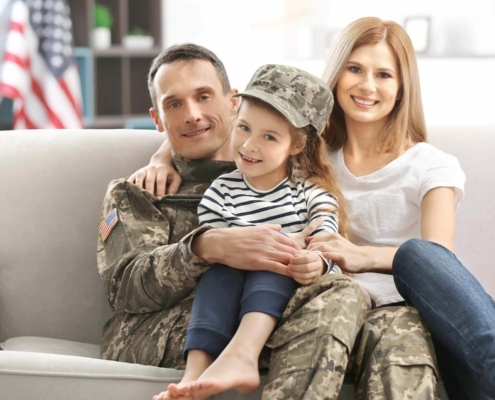
How to Help Seniors Living Independently During Winter
Winter can be a beautiful season, but it also comes with unique challenges for seniors, especially those living on their own. Colder temperatures, icy conditions, and shorter days can make daily routines more difficult and can increase the risk of health issues.
For seniors living independently, these seasonal challenges mean that family members and caregivers must be especially attentive to keep their loved ones safe, healthy, and comfortable throughout the winter. Here are some caregiver tips for ensuring that seniors living independently can navigate the season safely and confidently.
1. Check the Heating System and Insulation
For seniors living independently, a warm home isn’t just a comfort—it’s a necessity. Before the winter months set in, it’s essential to make sure that the heating system is functioning well and that the home has adequate insulation. Ensuring that the furnace is in good working order, vents are unobstructed, and windows are properly sealed will help maintain a cozy environment. Checking these elements early on can also help avoid any unexpected and costly repairs during the coldest days.
Encourage your loved one to keep their thermostat set at a comfortable level. While saving on heating bills can be a consideration, safety is the top priority. For seniors with financial constraints, local resources and government assistance programs are available to help cover heating costs, so look into these options if needed.
2. Stock Up on Essentials
Winter weather can sometimes make it difficult to get out of the house, especially if roads are icy or there’s heavy snowfall. Caregivers and family members can assist seniors living independently by ensuring they have a stockpile of essential supplies. This can include pantry staples, bottled water, medications, batteries, and other necessary items that are easy to access and not too heavy to handle.
To help avoid falls or strain from lifting, encourage seniors to use a manageable amount of items at a time or suggest that someone stops by weekly to restock supplies. If you live far away, consider using delivery services to ensure their needs are met.
3. Prevent Slips and Falls
Icy sidewalks and slippery floors are a serious hazard during winter. For seniors living independently, falls can lead to severe injuries and extended recovery times. Caregivers should check that entryways, sidewalks, and driveways are clear of ice and snow. You can also hire a trusted snow removal service if your loved one cannot handle this task themselves.
Encourage the use of sturdy shoes with good traction, even for indoor use if floors tend to be slippery. Installing handrails, using rubber mats, and placing salt or sand on outdoor walkways can also add an extra layer of safety.
4. Monitor Health Regularly
Winter can worsen certain health conditions, especially for seniors who may already struggle with respiratory or heart issues. Cold air and lower humidity levels can lead to dry skin, dehydration, and worsened asthma symptoms. Caregivers and family members should regularly check in with seniors to monitor their overall health and make sure they’re managing any chronic conditions effectively.
Encouraging regular hydration is one of the simplest ways to support immune health and prevent dryness in winter. Additionally, helping seniors keep up with medications and attend check-ups, either in person or via telehealth, can make a significant difference in managing seasonal health concerns.
5. Encourage Safe Physical Activity
Staying active can boost both mental and physical health, but exercising outdoors may not always be possible during winter. Encourage seniors to engage in safe indoor activities, such as stretching, light strength exercises, or even gentle yoga. Many fitness programs cater to seniors and can be done safely at home with minimal equipment.
If your loved one enjoys socializing or could use some motivation, consider recommending community programs or online classes geared toward seniors. Staying active helps maintain mobility and balance while warding off seasonal depression and cabin fever.
Thinking of even more practical ways you can get your senior involved? Check out our guide on meaningful winter activities for older adults.
6. Keep Up With a Nutritious Diet
Eating a balanced diet can be especially challenging during winter when fresh produce might not be readily available. Caregivers can help by providing easy access to nutritious foods that support immune health, such as fruits, vegetables, and whole grains. For seniors who don’t enjoy cooking for themselves, simple, balanced, and pre-prepared meals can be a convenient and nutritious solution.
Vitamin D levels can also drop in the winter due to reduced sunlight exposure. A healthcare provider may recommend supplements if necessary, but certain foods like fish, fortified dairy products, and eggs also help increase vitamin D intake.
7. Address Seasonal Depression
For many, shorter days and colder weather can lead to feelings of isolation and sadness, often referred to as seasonal affective disorder (SAD). Seniors living independently are particularly vulnerable to this, as they may spend extended periods indoors. Caregivers and family members can play an important role by staying connected and providing regular social interactions.
Phone calls, video chats, and visits are great ways to maintain a sense of connection and lift their spirits. Consider arranging regular visits from family, friends, or neighbors to keep them socially engaged. Some caregivers even organize weekly activities, such as game nights or movie marathons, to keep spirits high.
8. Monitor for Signs of Hypothermia and Frostbite
It’s essential to recognize the signs of hypothermia and frostbite, as seniors are more susceptible to these conditions. If your loved one has been exposed to cold temperatures, monitor them for symptoms such as shivering, confusion, slurred speech, or clumsiness. If these signs appear, seek medical assistance immediately.
To help prevent these risks, remind seniors to dress in layers and keep extra blankets handy around the house. In case of an unexpected power outage, having backup sources of heat, like a fireplace or portable heater, can provide a safeguard until power is restored.
9. Prepare for Emergencies
Power outages and extreme weather can occur unexpectedly in winter. Having a plan in place is essential for any senior living independently. This might include making sure they have a backup power source, such as a generator, extra blankets, flashlights, and a fully charged cell phone. Make sure they know how to contact family members or caregivers quickly if something urgent arises.
Consider organizing regular calls or check-ins, especially during bad weather. Some caregivers establish a communication plan with neighbors or friends nearby who can help out in case of an emergency.
10. Arrange Regular Visits or Check-Ins
One of the best ways to ensure your loved one’s safety and well-being during winter is by establishing a schedule for regular visits or calls. Having someone check in, whether it’s a caregiver, friend, or family member, can provide peace of mind and reduce feelings of isolation for the senior. These check-ins also provide an opportunity to notice any potential issues with the home, health, or general environment that could be addressed promptly.
If you can’t visit in person, consider setting up video calls or encouraging your loved one to join a senior-friendly social platform where they can interact with others.
How AVCC Can Help Seniors Living Independently
AVCC understands the unique needs of seniors living independently, especially during challenging seasons like winter. We provide compassionate and professional caregiving services tailored to meet the needs of each senior. Whether it’s arranging regular visits to assist with everyday activities, helping with house chores, or ensuring that seniors stay connected with loved ones, AVCC’s caregiver teams are dedicated to supporting seniors in their desire to remain safe and comfortable at home.
For Veterans or their surviving spouses, AVCC also assists with securing Aid and Attendance Benefits, which can provide additional financial support for home care needs. These benefits make it possible for seniors to maintain their independence with extra help, reducing worries about daily wintertime challenges.
If you or a loved one could benefit from the support of a caring team, consider reaching out to AVCC. We connect clients with caregivers and home care providers who are here to help make wintertime safe, warm, and comforting for all seniors living independently. We’re here to ensure that seniors can enjoy every season with confidence and peace of mind.
The Bottom Line
Winter safety for seniors living independently is a top priority. With proactive planning and the help of trusted caregivers, family members can keep their loved ones secure, warm, and comfortable throughout the season.
Stay Safe This Winter With AVCC’s Expert Caregiving Support
Keep your loved ones safe and comfortable this winter. Contact AVCC today to learn how our experienced caregivers and dedicated team can support seniors living independently with compassionate, reliable care and access to essential benefits.
Share This Post
Interesting links
Here are some interesting links for you! Enjoy your stay :)Pages
- About Us
- Account
- Areas We Serve
- Assisted Home Health Care
- AVCC Difference
- AVCC Provider Tools
- Bathing
- Become a Home Care Provider
- Become a Provider
- Become a Provider Now
- Blog
- Companionship
- Contact
- Contracts/Agreements
- Contracts/Agreements
- Fast Track for Providers
- Financial Assistance for Veterans
- For Providers
- Give the Gift of Home Care This Holiday Season
- Home
- Home Care Referrals
- Home Care Services
- HTML Markup
- Laundry
- Light Housekeeping
- Login
- Logout
- Meal Preparation/Feeding
- Members
- Missouri Veterans Benefits
- Password Reset
- Presentations
- Presentations
- Privacy Policy
- Private Duty Home Care
- Providers Tools and Resources
- Referral Resources
- Register
- Resources
- Start the Process
- Thank You
- Thank You – Become a Provider
- Thank You – Home Care Referral
- Thank You for Registering
- Transportation
- User
- VA Aid and Attendance
- VA Aid and Attendance Form
- VA Assisted Living
- VA Benefits for Spouses
- VA Home Health Care
- VA Nursing Home
- Veteran Emergency Assistance
- Veterans Assisted Living
- Veterans Care Coordination
- Veterans Home Care
- Veterans Home Care
- Veterans’ Assistance
- Veterans’ Pension Benefits
- Why American Veterans?










